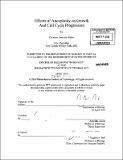Effects of aneuploidy on growth and cell cycle progression
Author(s)
González Rubio, Christian
DownloadFull printable version (8.263Mb)
Other Contributors
Massachusetts Institute of Technology. Dept. of Biology.
Advisor
Angelika Amon.
Terms of use
Metadata
Show full item recordAbstract
In budding yeast, aneuploidy has a detrimental effect in cell growth and proliferation. The work presented here shows that most aneuploid yeast strains delay cell cycle entry by increasing the critical size for budding and by decreasing the rate of volume accumulation during the G 1 phase of the cell cycle. This increase in the critical size for budding is due to in a delay in CLN2 mRNA accumulation and can be suppressed by supplying cells with high levels of this cyclin. Deletion of the cell cycle entry inhibitor WHI5 only partially suppressed the GI delay of aneuploid cells. These two results combined point to the possibility that aneuploidy might be interfering through a parallel pathway with the activation of the transcription factors Swi4 and Swi6. The growth defect seen in aneuploid cells is not due to gross defects in the translational machinery or lack of nutrients. Instead, yeast cells respond to aneuploidy by altering the translational efficiency of a number of genes. The results presented here indicate that aneuploidy affects entry into the cell cycle in at least two ways. The condition elicits a growth defect during the G 1 phase of the cell cycle and increases the critical size for budding.
Description
Thesis (Ph. D.)--Massachusetts Institute of Technology, Dept. of Biology, 2010. Cataloged from PDF version of thesis. Includes bibliographical references.
Date issued
2010Department
Massachusetts Institute of Technology. Department of BiologyPublisher
Massachusetts Institute of Technology
Keywords
Biology.